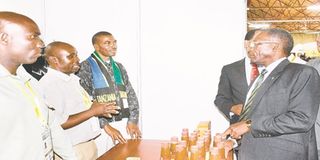Investors face capital woes to increase honey production

Former Prime Minister Mizengo Pinda (right) is briefed about how honey is processed during a 2014 beekeeping exhibition in Arusha. PHOTO|FILE
What you need to know:
According to a Tabora honey producer, Mr Godfrey Isidori, the local market I good. He produces 360 litres a year and sells at Sh18,000-20,000 a litre, depending on the season. “The price is low compared with operational costs, but it is higher in Kenya and other neighbouring countries.”
Dar es Salaam. Heavy investment is needed to increase beeswax and honey production, stakeholders say.
Anepa Food Production Limited managing director Anna Toroka says honey exportation requires a huge capital.
“The brand and quality of honey I supply locally are great. Even foreigners are impressed and would like me to export it, but the capital is a hindrance,” she told BusinessWeek.
Anepa supplies honey to local shops, supermarkets and households in wholesale and retail.
According to a Tabora honey producer, Mr Godfrey Isidori, the local market I good. He produces 360 litres a year and sells at Sh18,000-20,000 a litre, depending on the season. “The price is low compared with operational costs, but it is higher in Kenya and other neighbouring countries.”
He says in Kenya a litre of honey is sold for up to Sh50,000, but he is unable to do so because of capital and licensing difficulties. So, agents and suppliers are the ones who benefit more since they buy honey at low prices locally and export it.
Mr Isidori takes care of his family of 18 from honey proceeds.
A trade, research and planning official with the Tanzania Trade Development Authority, Mr John Swalo, says honey is not doing well in the international market because it is not branded. Tanzania produces 19,000 tonnes of honey a year, but only 137.4 tonnes are exported. The rest are consumed locally.
Mr Swalo says more than 16 nations need honey. So the market is huge.
He calls on producers to register and brand their products at the Tanzania Bureau of Standards (TBS) for marketing internationally.
According to TBS, only few honey dealers are registered
Under its five-year programme spanning from 2013/14 to 2017/18, covering 10 regions, the National Economic Empowerment Council (NEEC) has made headways in facilitating the establishment of a defined honey market. Honey collection centres have been set up and the use of a warehouse receipt system has been promoted.
According to NEEC executive secretary Beng’i Issa, training on better beekeeping practices has been conducted in 28 cooperatives.
NEEC aims at increasing honey production to 138,000 tonnes, up from the current19,000 tonnes annually. Stakeholders call on the public and private sectors to increase efforts of promoting honey production and marketing.


